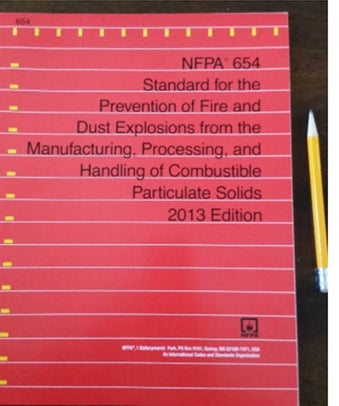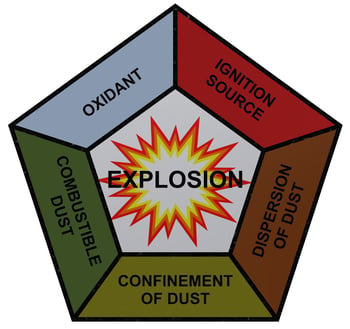This is one of the most important questions you can ask. The answer to this question can require you to invest in expensive protection equipment or not, but that is much better than the loss of thousands of dollars in equipment, production time, and most importantly, employee safety. There are a few ways to answer this question. Some of which are safer than others. The main question you will need to ask yourself, is the dust combustible?
Is My Dust Explosive?
If the material can react with oxygen then there is a chance it can be explosive. However, just because it is combustible, doesn’t mean it is explosive. Generally if a dust is greater than 500 micron in size, it is not explosive. However, what if the dust is smaller than 500 microns?
The safest course is to send your sample into a test facility for a simple Explosibility Screening (Go/ No Go) test. This test will take a small sample and try to ignite it to see if the sample will explode. If it explodes then an explosion severity test should be performed, which provides data on the speed of the explosion (Kst) and strength of the explosion (Pmax). This data is very important to designing equipment that will prevent, contain, or divert explosions safely.
Some dust might be generated from material you got from a vendor, and they might have already done explosion testing on the material. You might be able to use this data for the design of your equipment depending on the process. The main thing being, what are you doing with your process? If you are sorting, grinding, drying, etc. the material then you can be changing the explosibility of the dust. If there has been a change, then the material should be tested again or you can assume it to be explosive and use the suitable published data.
The Explosibility of Dust
The explosibility of dust is highly dependent on the material size and humidity. A few examples would be aluminum. Spirals of aluminum from trimming wouldn’t be explosive, but a fine aluminum powder would be. Another example is wood dust. Dry wood dust is very explosive, while wood with a high water content is not.
You should not depend on your history working with the dust, because dust explosions are fickle. You might be working with dust for 20 years and have no issues and then suddenly there is an explosion. Or it might be the 1st time you work with a dust that an explosion happens. One thing is for sure, if you have had flash fires with the dust, you definitely should have it test for explosibility. A flash fire is a sign that you have an issue with your process and should do further investigation to make sure you won’t have an explosion and to prevent more flash fires.
Dust Hazard Analysis (DHA)
If your dust is explosive, you will then need to have a Dust Hazard Analysis (DHA) done on your process/ building, etc. The DHA reviews your process, operational and maintenance procedures, equipment, etc. It then provides procedures, equipment changes, etc. to address the issues and provide for a safe process. OSHA will request a copy of your DHA during any inspection. So it is important that you have an answer to the question “Is my dust explosive?” and have something to back up the answer in case you are asked by OSHA, your insurance company, local fire inspector, etc.
To learn more about which dust collector, please contact our experts at 440-543-7400 or visit our website: www.dustcollectorhq.com.
To improve efficiency and safety, there is no substitute for an on-site inspection by an experienced expert. Click below to start with a free 20-minute phone consultation by clicking the button.

